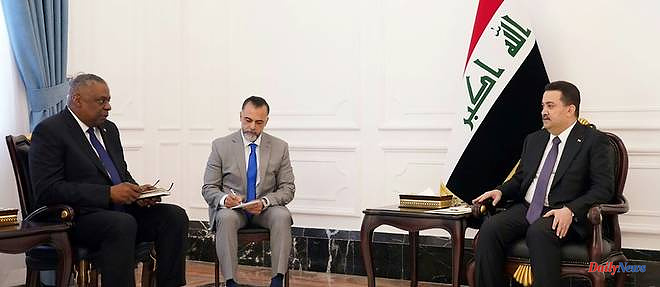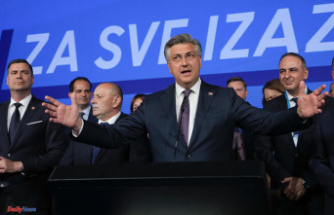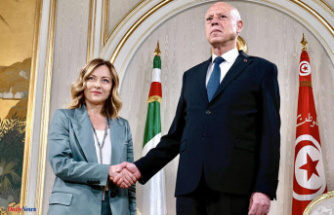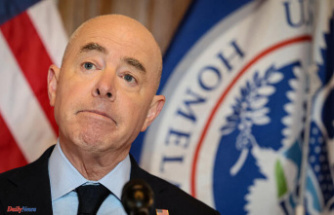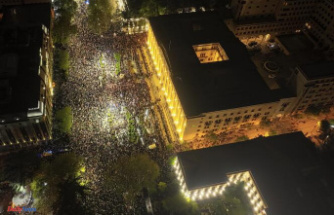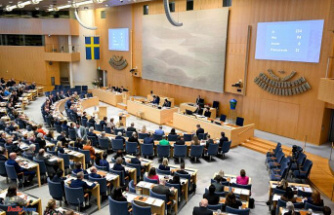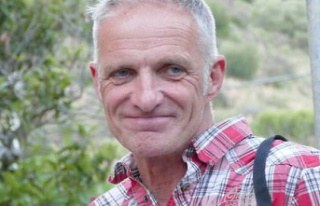US Secretary of Defense Lloyd Austin on Tuesday wished to "strengthen" the partnership between the United States and Iraq, during a surprise visit to Baghdad shortly before the twentieth anniversary of the American invasion that overthrew Saddam Hussein.
The Secretary of Defense also assured that the American soldiers deployed in Iraq as part of an international anti-jihadist coalition could remain there if the Iraqi government so wished, a subject which is still delicate in view of the recent history which unites the two countries. .
On March 20, 2003, American troops launched their offensive in Iraq, supported by an international coalition, with the aim of getting their hands on the alleged weapons of mass destruction of Saddam Hussein's regime. The invasion had opened one of the bloodiest pages in the history of this country which will be marked by years of conflict and political instability.
Today, the Iraqi government maintains strong ties with Washington, particularly on the military level, even if it has Tehran as a close ally. These alliances with two enemy countries sometimes lead Iraqi officials to engage in a balancing act.
"I am optimistic about the future of our partnership. The United States will continue to strengthen and expand our partnership in support of Iraqi security, stability and sovereignty," the US minister told reporters. of his talks on Tuesday in Baghdad with Defense Minister Thabet al-Abbassi and Prime Minister Mohamed Chia al-Soudani.
For his part, Mr. Soudani also stressed his government's desire to "consolidate" its relations with Washington, while saying that it seeks to "maintain balanced relations" with regional and international powers.
While some 2,500 American soldiers are stationed in Iraq as part of the international coalition against the Islamic State (IS) group, Lloyd Austin assured that American forces could remain if the Iraqi authorities demanded it.
Routed in Iraq in 2017, the IS occasionally claims deadly attacks in the country. At the end of 2021, Iraq announced the "end of the combat mission" of the international coalition, whose official role is now to train and advise Iraqi troops.
"But we must be able to operate safely to continue this vital work", warned the head of the Pentagon, while the bases housing the coalition have been in recent years the target of attacks never claimed but often attributed to pro-Iran armed factions.
"I would like to thank the Prime Minister and the Minister of Defense for their commitment to guarantee the protection of coalition forces (...) against state and non-state actors," he said.
Shia pro-Iran politicians, including representatives of the former Hachd al-Shaabi paramilitaries, have regularly demanded the departure of American troops, but since they are represented in government, they are less insistent.
The head of the Pentagon also went to autonomous Kurdistan (north) where he met the president of the region Nechirvan Barzani, a great ally of Washington.
"Unfortunately, Daesh is not the only threat facing this region," he said from Erbil, condemning "the repeated attacks from Iran".
"These attacks violate Iraq's sovereignty, put Iraqi lives at risk and are a disincentive to the Iraqi people," Austin told reporters.
He also called on Erbil and Baghdad "to work together for the good of all Iraqis" and urged "Kurdish leaders to put aside their divisions".
"We thank the United States for its continued support for Iraq and Kurdistan, we have common interests (...) regarding the maintenance of security and stability of Iraq", indicated for his part. Mr Barzani.
Relations between Baghdad and Washington deteriorated considerably when, under the presidency of Donald Trump, an American armed drone killed Iranian general Qassem Suleimani and Abou Mehdi al-Mouhandis, former number two of Hachd al-Chaabi, in 2020. the Iraqi capital.
Baghdad has been the scene of intense diplomatic activity in recent weeks. Iraqi leaders successively received the heads of diplomacy from Saudi Arabia, Iran and Russia, before the visit in early March of UN Secretary General Antonio Guterres.
German Foreign Minister Annalena Baerbock also began a four-day visit to Iraq on Tuesday, where she was received in Baghdad by her Iraqi counterpart Fouad Hussein.
"ISIS remains a threat. That's why German soldiers are here (...) as part of the anti-ISIS coalition and the NATO mission," she said at a conference. press.
07/03/2023 23:03:36 - Baghdad (AFP) - © 2023 AFP

